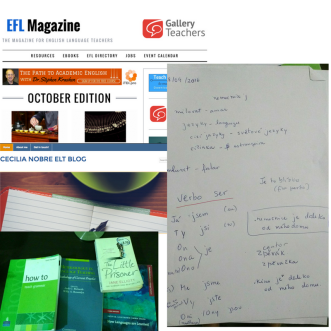Home » Posts tagged 'ESLteachers'
Tag Archives: ESLteachers
Twenty Practical and Affordable Tips for Professional and Language Development for Freelance Teachers

I’ve been teaching English in Rio de Janeiro for 17 years (wow, I feel O-L-D!) and I decided to work “solo” 6 years ago. Some freelance teachers might have a feeling they don’t belong to a community; after all, there isn’t a staffroom to hang around in for a chinwag or coffee, or no teachers’ or parents’ meetings – which can lead to lack of motivation for professional and language development (PD), right?
“Why bother with Professional Development if I have my private students and charge whatever I want?”
Here are some reasons:
1.You are indeed part of a huge community, a huge staffroom – just see how many fellow teachers you can connect and collaborate with on Facebook and Twitter, for instance.
2.We teachers should evolve – English does, and so do our students. What makes you believe you don’t need to learn the language and find opportunities to be the best that you can be?
3.If you want to stop the auction culture among some private students (“I’m going to hire teacher X because they charge 3 times less than teacher Y”) you should stand out from the crowd and look for professional development opportunities.
4.We are lifelong learners – as cliché as it might sound, learning never ceases.
I have compiled 20 practical and free of charge tips on how to find professional development ideas as well as language development ideas for freelance teachers (they actually work for any EFL/ESL teacher!)
Disclaimer: Some tips do require a sort of investment, but they are generally pretty affordable.
Part 1: Professional Development tips
- Read teaching blogs
There are amazing teachers out there who write their own blogs or who collaborate with others. They usually share lesson plan ideas, tips on how to teach certain age groups, goals, and topics to debate. Some names to look out for are Luiz Otávio Barros, Lizzi Pinard, Ricardo Barros, Rachel Roberts, Sandy Millin, Marek Kiczkowiak and Robert McCaul.
2. Read specialized magazines
Reading might give you further motivation to reflect on your experiences inside and outside the classroom.
Some free ELT magazines are BrazTesol Newsletters ( printed version if you are in Brazil), EFL magazine, Humanizing Teaching magazine, Voices Magazine by the British Council.
3. Read an essential ELT/ Applied Linguistics book
A bit of theory does wonders for our practice. It goes without saying but some of the big names in ELT are Scott Thornbury, Jeremy Harmer, Penny Ur, Jim Scrivener.
4. Join a #Twitter #Chat
You can join weekly Twitter chats by using different hashtags. The best ones, in my opinion, are #ELTchat and #eltchinwag. The conversations are based on various ELT topics chosen by us (that includes you if you join Twitter!)
5. Write a blog
That’s a good way to engage with a wider ELT community as well as finding your voice in the industry.
6. Learn another language
One of the most effective ways of reflecting on our own practice is putting ourselves in our students’ shoes. What I most like about learning Czech is that I step out of my comfort zone – and this is where learning happens.
7. Give a talk or a webinar
Become a member of your local or national Teachers’ Association and show interest in giving a talk at their next conference. If you are looking for online opportunities, you must check out EFLtalks. Discuss a topic on which you are passionate and have worked on and share your insight with the world.
8. Engage in Facebook groups
Exchange ideas, meet other teachers, make questions, engage in conversations on ELT issues. You can check out BrELT and Private English Teachers Reloaded.
9. Observe a colleague’s lesson
Ask a friend you trust and admire to watch their lessons, take notes and discuss this with them.
10. Reflect on a given lesson
Reflect and change if necessary. If possible, record your lesson ( always ask for your students’ authorization) and watch it later.
11. Attend conferences,Online Courses and webinars
There are a great number of webinars and online courses free of charge ( Coursera and FutureLearn, to name a few). Besides that, become a member of local and national Teachers’ Associations and check their calendars for conferences and talks. They can be transformational.
12. Subscribe to ELT YouTube channels
Lots of teachers forget about or just overlook this amazing facility when watching YouTube channels. Most ELT publishers are on YouTube. Most ELT publishers are on Youtube : Macmillan, Oxford, Cambridge, The New School, TESOL Academic, TEFL Equity Advocates and IATEFLtalks.
13. Subscribe to ESL Teachers’ YouTube channels
It is refreshing to see what other English teachers are doing on YouTube. I highly recommend Papateachme, Engvid, BBC learning English, London Language Lab and Jamie Keddie.
14. Connect to educators you look up to on Twitter
Most of the ELT specialists are on Twitter and they are quite approachable and friendly. Who knows you’re lucky enough to be followed by Scott Thornbury ( yes, you can tell I’m one of his biggest fans!).

Part 2 : Language Development for teachers
15. Hire a private teacher or attend group classes
If psychologists need to do therapy, why can’t we hire tutors or attend English classes? Search for a qualified and experienced teacher who truly understands and meets your linguistic needs. Why not giving it a go?
16. Study independently using a grammar book
If we expect our students to take ownership of their learning, we should be the first to set an example. I’ve recently bought The Teacher’s Grammar of English written by Ron Cowan (Cambridge). Other useful books are Idioms and Phrasal Verbs by Cambridge and Sound Foundations written by Adrian Underhill (Macmillan).
17. Keep a lexical notebook
We hear and read new words, expressions and chunks all the time. Keep a record of them in a notebook and revisit your notes each week. You can read more about it here and check out Natália Guerreiro’s Fanpage Vocab Notebook.
18. Listen to non-ELT podcasts
This is a great listening practice – you just need to choose a topic of interest ( say you like indie music, fashion, technology and google it. I highly recommend A History of Ideas by BBC radio and hilarious My Dad Wrote a Porno ( it’s not what you think, I promise!)
19. Subscribe to non-ELT YouTube channels
YouTube subscriptions are usually overlooked by teachers but they are so valuable. Just pick up your favourite topics and look for them on YouTube. As a subscriber, you’ll receive an email each time there is a new video.
20. Make new English speaking friends through Facebook and Twitter
Here you’ll kill two birds with one stone 🙂
How about you? What are your tips for professional and language development? I’d love to hear your thoughts. 🙂

